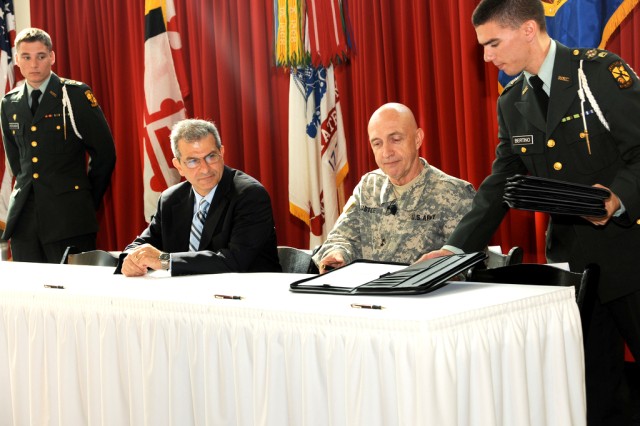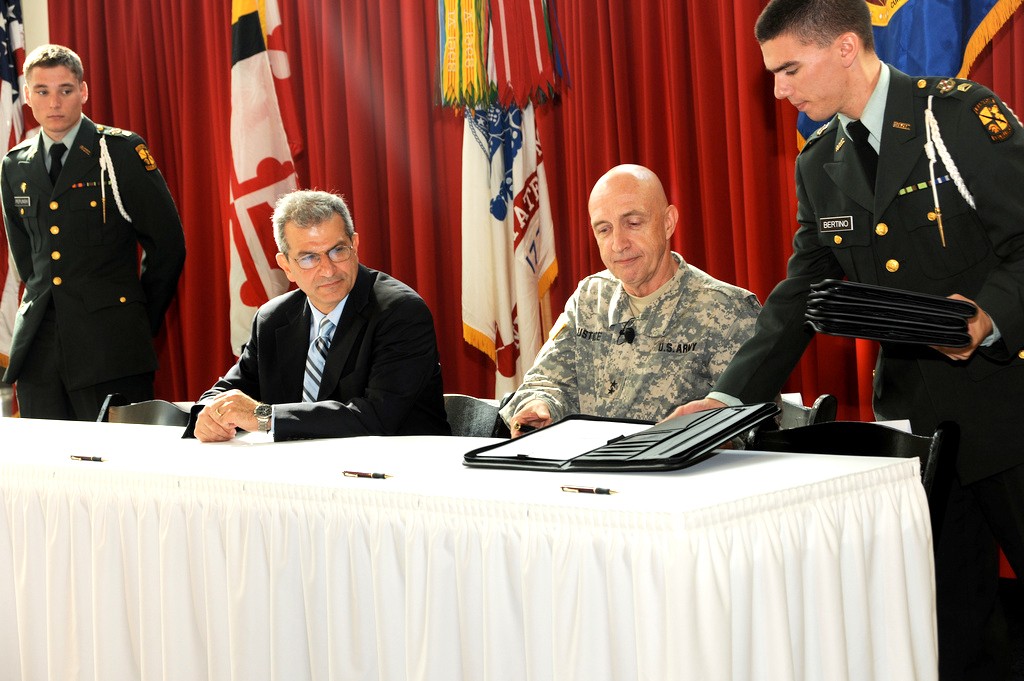
COLLEGE PARK, Md. (Sept. 29, 2010) - The U.S. Army continued to expand its relationships with institutions of higher education by signing an agreement with the University of Maryland here Sept. 28.
Leaders from the U.S. Army Research, Development and Engineering Command and the university entered into a Cooperative Research and Development Agreement, or CRADA, at the school's Jeong H. Kim Engineering Building.
Maj. Gen. Nick Justice, RDECOM commanding general, told an audience of about 150 university leaders, professors and staff, Reserve Officer Training Corps cadets and instructors, state officials and leaders from Army research centers that education is key to the success of the Army and the nation.
"The academic infrastructure in our nation is probably the strongest infrastructure we have," Justice said. "Education is the backbone of America's strength. Having our Army grounded in its leader-development programs is what makes the United States Army into Army Strong."
The CRADA creates a partnership for research through use of the school's laboratories, faculty, facilities and equipment. RDECOM has signed similar agreements this year with the University of Delaware and Morgan State University.
Dr. Nariman Farvardin, University of Maryland interim president and senior vice president for academic affairs, expressed optimism for the CRADA after beginning the process just last year.
"I am so delighted that in less than a year we are gathering here to celebrate some of the fruits of the seeds that we planted at the time," Farvardin said. "The state of Maryland is a powerhouse and will be a bigger powerhouse in engineering excellence."
Confronting world's tough problems
Justice, who earned a bachelor's degree in history from the University of Maryland, and Farvardin emphasized that America's educational institutions must lead the effort in confronting the world's problems.
Farvardin said his faculty and students are committed to the challenges in public health, education, energy, climate change, food safety and national security. This agreement will advance those efforts, he said.
"We are very fortunate at the university to be partnering with such talent and the Army's capabilities and dedication," Farvardin said. "We as an institution make a commitment to take responsibility for our nation's future. As you know, our country and the rest of the world are being confronted with some of the most vexing problems of all times."
Justice echoed those remarks as he spoke about the school's Army ROTC cadets as they prepare for their roles in protecting national security.
"When these young men carry that color, they are holding the history of our nation," he said, indicating the ROTC cadets carrying the national colors. "They are guarding that security, and it represents for you, the assumption of responsibility for our nation that the youth at this university will assume in the very near future.
"You [must] be emotionally touched when you see the impact that our education system has on transferring that responsibility of our nation and growing our nation's security - not necessarily in the weapons systems -- but in the hearts of our people," Justice added.
Positive economic impact on Maryland
The ceremony's common theme is that the CRADA, combined with the state's strong scientific community, will bolster Maryland's commitment to research and development efforts.
Christian Johansson, secretary of the Maryland Department of Business and Economic Development, said the state is poised to lead the nation.
"This is a hotbed for innovation," Johansson said. "The fact that we have an innovation economy is what's largely kept Maryland better protected than the rest of the United States from the impact of this recession."
Justice addressed the positive effects on Maryland from the base realignment and closure, which is bringing thousands of jobs to Aberdeen Proving Ground and Fort Meade.
"This state is undergoing a major transformation," he said. "I am very proud to lead an organization that is such an invigorating part of this state's economy, its environment and its future."
Looking to the future
Johansson said the influx of engineers and scientists will help Maryland recover from the recession and position the economy for growth.
"When you look at the overall economy, for us right now, the economy is job one because what's happened over the past few years," Johansson said. "[Maryland is] the number one state in the United States when it comes to sponsored research per capita. We have an incredible base to work from."
Farvardin said this new relationship will help the university and Army secure greater achievements in support of the country.
"We [at the University of Maryland] placed an extraordinary emphasis on building partnerships," Farvardin said. "Our commitment to taking responsibility for the future, on the one hand, and our commitment to building partnerships is manifested beautifully in this agreement that we are about to sign today."

Social Sharing